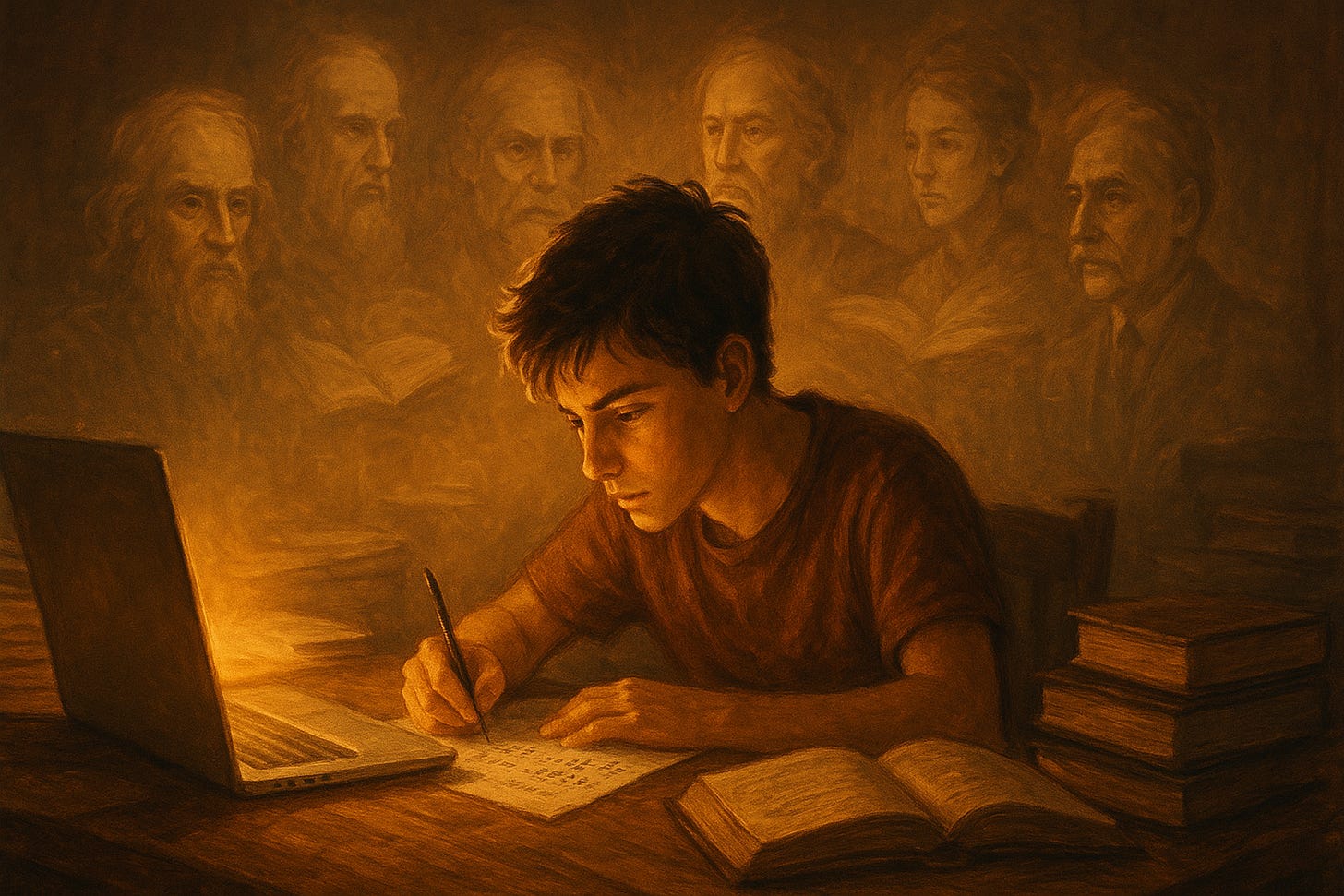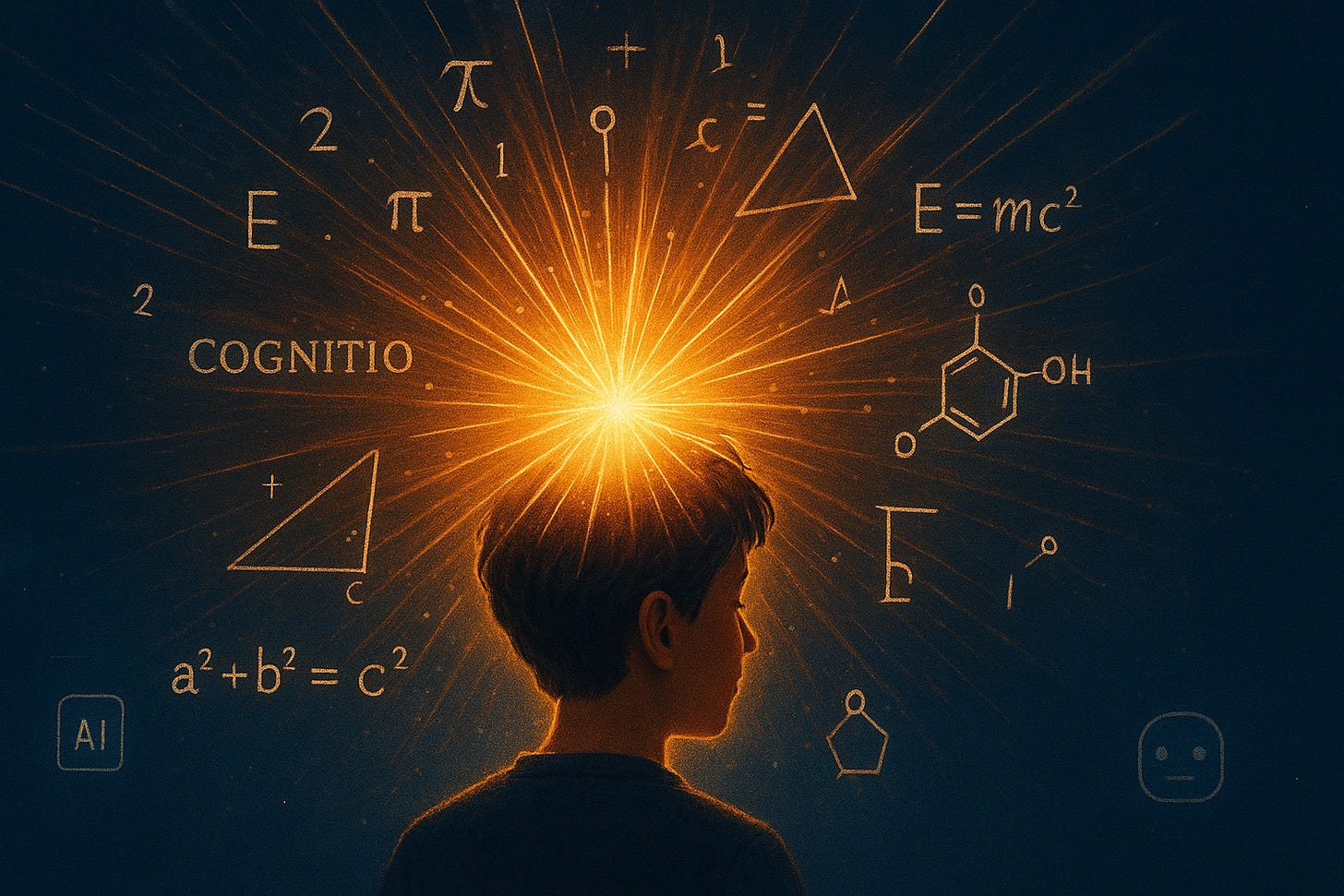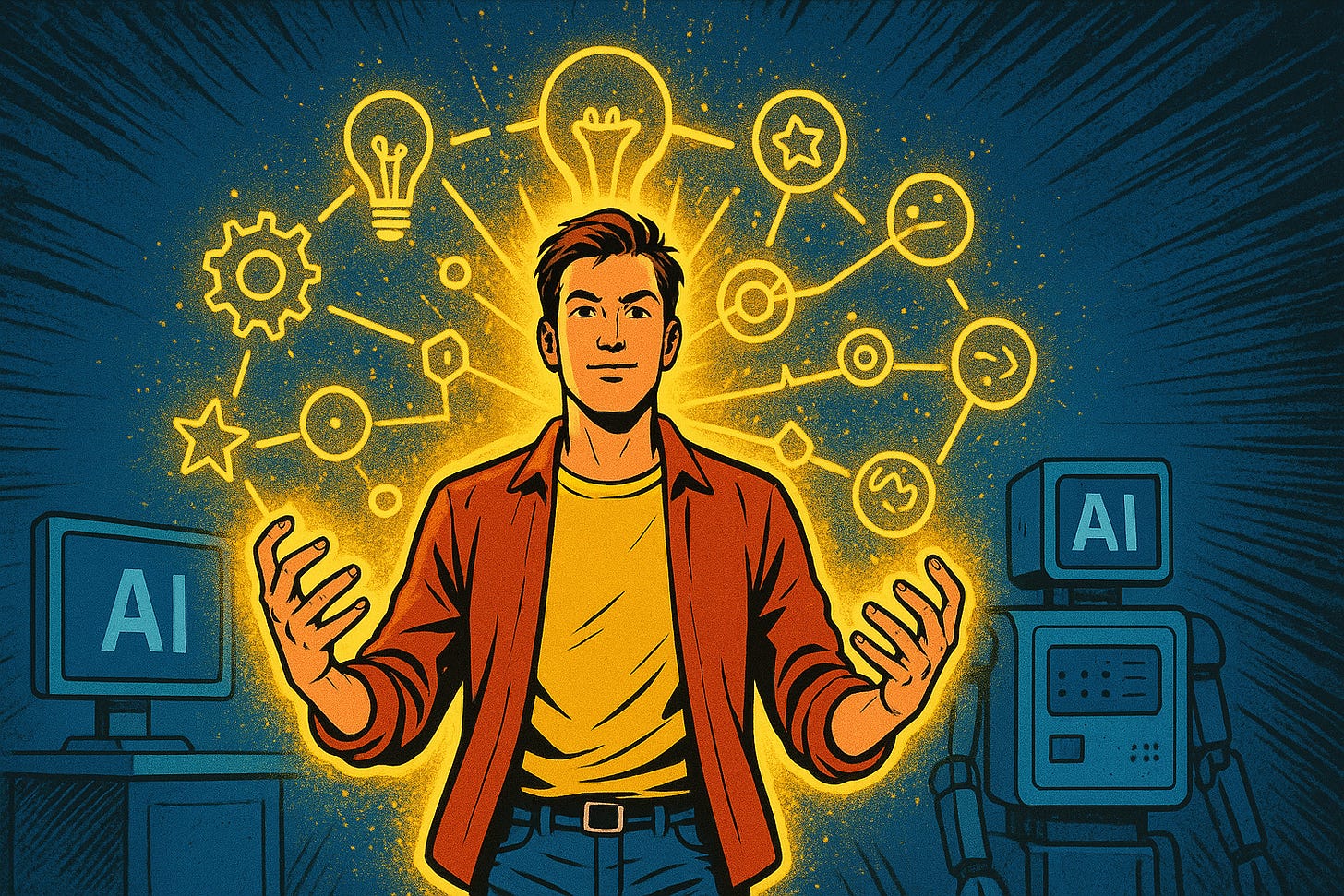Today, I watched my son struggle with his math homework.
ChatGPT was open on his laptop.
The answer? Three clicks away.
Instead, he sat there… Writing frantically on his papers with multi-derivative exponential integral logarithmic methods. I don’t understand a thing about it.
But I understand him.
What makes young talent? What drives them to study? When it’s just a click away?
It took me back to my late nights with my books…
When you’re deep in some study, there’s this particular moment.
Hours in.
Your brain feels like it’s literally stretching.
You’re holding five different concepts in your head at once, trying to see how they connect.
Then suddenly—click.
This pattern emerges.
Everything reorganizes itself.
I don’t know about you, but I’ve never felt that rush from anything else.
When I forced myself to memorize all those organic chemistry reactions in college, I wasn’t building a database to look things up when I needed it.
I was actually expanding my mental RAM.
Each fact I locked in freed up space to think about bigger things.
You can’t hold a complex mental model in your mind if you’re constantly looking up the basics. The learned facts become the foundation for your thoughts, your ideas.
My brain isn’t really competing with AI. It’s doing something completely different.
When I study, you know, really study, I’m not just learning about the subject. I’m becoming someone who thinks in that subject’s language. After years of math, I started seeing these patterns everywhere. And after getting acquainted with philosophy, every conversation became something to analyze.
AI could give me these answers in seconds, but it can’t make me understand it. Not if I don’t put the works in.
Maybe we study for our friends? To show off? Sure, it’s there. Although I’ve never really been bothered by it. But I’m guessing that’s not what keeps people up, reading at 2 AM. Eyes burning. Coffee gone cold.
There is something more primal than that. There’s a kind of satisfaction in earning understanding through the struggle that feels fundamental to being human. I remember spending three days on a single physics problem in grad school. Three days. When I finally cracked it, the feeling was almost physical—like I’d actually built something with my hands.
That victory?! That was MINE!
The scary thing is that we might be the last generation that knows what it feels like to truly not know something. To sit in that discomfort. To push through it.
My friend’s daughter uses AI for everything now. Essays, math, coding projects. She gets perfect grades. But when you talk to her about these subjects, there’s something missing. She knows about them but doesn’t know them.
It’s like the difference between reading about swimming and feeling water against your skin. She’s never been thrown in the deep end, never had to figure out how to float.
The memorization thing keeps coming back to me. When I was learning Latin, I drilled vocabulary for months. Mindless repetition. Boring as hell. But after a while, something shifted. I wasn’t translating anymore—I was thinking in Latin. Because you’re not only translating, you’re internalizing the Roman culture. Those memorized words? They become part of a story. The substrate becomes actual thought.
Try getting that from Google Translate!
And let’s talk about errors for a second. Not AI errors—human errors. The beautiful, productive kind.
When I study, I get things wrong constantly. But each mistake teaches me where the edges are, where my understanding breaks down. I build my intuition from my failures. AI gives me mostly correct answers, but it doesn’t show me all the fascinating ways I could have been wrong. Those wrong paths? That’s where true insight lives.
Like just today: I was debugging some code with Copilot. It kept suggesting solutions that worked but felt wrong. Took me an hour to realize why: the AI was solving the immediate problem but creating architectural debt. I only caught it because years of painful experience had trained my instincts. Without that foundation, I’d have blindly accepted technically correct but fundamentally flawed solutions.
There’s a difference between using AI as a tool and using it as a replacement for thought. It should be a collaborator. You should have a conversation with it. I can push back, combine ideas, see where it’s hallucinating. But without that background? You’re just a passenger. Along for the ride.
Studying for years on a subject teaches you also about commitment in a way nothing else does. It’s like a relationship with knowledge. You court it, fight with it, reconcile, go deeper. You learn that real understanding doesn’t come in eureka moments but in the slow accumulation of knowledge.
I do wonder however if I’m overthinking this.
Maybe the reason to study could be simpler??
It feels good. Not the studying itself—that often sucks. But becoming someone who understands things thoroughly?
That changes how you move through the world. Patterns emerge everywhere. Conversations become richer. Colors get brighter (nah, just kidding). You’re not just consuming reality; you’re peeking behind the veil.
I think about those years I spent in formal education. At the time, it felt endless. Now? Those years of struggle gave me the tools to think. Not just to know things or find answers, but to actually think.
To hold five different architectures in my head at the same time, trying to make them work together. To see the connections that others miss. To build new ideas from scratch.
Looking at my son still wrestling with his homework, I realize something. He could click those three buttons. Get his answer. Move on. Get perfect grades.
Instead, he’s choosing the harder path. The human path.
The machines can have the answers. But the questions? The curiosity? The late-night obsessions and morning revelations? The way a problem follows you into the shower until you finally crack it?
That’s ours.
That’s what makes us human.
And honestly? In a world where AI handles the mundane, our ability to think deeply, to truly understand, to create from comprehension—that becomes our superpower.
Maybe that’s what my son already knows.
But maybe that’s why he keeps ChatGPT at bay and his pencil moving.
Maybe he understands something I’m just now figuring out: we don’t study despite having AI.
We study because of it.





Congratulations on such a son. He will get there.
I fully understand him and you:
The desire for real knowledge and understanding.
Understanding all the fundamentals that play a role.
Unleashing a jumble of perspectives/possibilities.
Knowing whether the foundations remain upright and fit logically.
The ultimate challenge of your abilities.
Grow slowly. Hours of driving in the flow to achieve results.
Forgetting the time and going on late into the night.
Make interim summaries to keep an overview.
Keep going until you finally get there.
Grown, fulfilled and proud.
Sometimes quickly, often weeks, sometimes in steps over many years.
Not only when you are young.
It has never let go of me. A passion.
There is so much to learn, always.
Professional and personal development.
And yes, that growing intuition-expertise it can bring.
That's a priceless companion and real wealth.